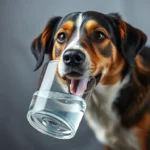
Introduction
Dog health care is crucial for maintaining the well-being of our furry companions. One common health concern that affects dogs is kennel cough, a highly contagious respiratory infection. Understanding kennel cough, its symptoms, and how to prevent it through vaccination is essential for all dog owners.
Vaccination plays a significant role in preventing kennel cough, but many dog owners often wonder: can a dog get kennel cough from the vaccine? This article will explore what kennel cough is, the importance of vaccination, the relationship between the vaccine and the disease, and how to best care for dogs to prevent kennel cough.
Understanding Kennel Cough
Definition of Kennel Cough
Kennel cough, scientifically known as canine infectious tracheobronchitis, is primarily caused by the bacterium Bordetella bronchiseptica, often in combination with other pathogens like canine parainfluenza virus and adenoviruses. This condition is characterized by inflammation of the dog’s trachea and bronchi, leading to a dry, hacking cough. The disease spreads quickly in places where many dogs congregate, such as kennels, dog parks, and training classes, primarily through airborne particles or direct contact with infected dogs.
Symptoms of Kennel Cough
The symptoms of kennel cough can vary in severity but typically include:
- Dry, persistent cough: Often described as a honking sound.
- Retching or gagging: Sometimes dogs will make sounds as if they are trying to clear their throat.
- Nasal discharge: Mucus may be present, but it is not always the case.
- Lethargy: Some dogs may seem more tired than usual.
- Loss of appetite: In more severe cases, dogs might show reduced interest in food.
The symptoms can last from a few days to several weeks, depending on the dog’s overall health and immune response. While kennel cough can be uncomfortable and annoying, it is rarely life-threatening in healthy dogs.
Risk Factors
Certain situations increase the risk of contracting kennel cough. These include:
- Crowded environments: Places like dog parks, boarding facilities, and groomers.
- Young or unvaccinated dogs: Puppies and dogs without proper vaccinations are at higher risk.
- Underlying health issues: Dogs with weakened immune systems or chronic respiratory problems are more susceptible.
Socialization is crucial for dogs, but understanding the risks associated with exposure to other dogs is equally important for their health.
The Role of Vaccination
Importance of Vaccination
Vaccinations are a fundamental part of dog health care. They work by stimulating the immune system to recognize and fight off specific pathogens. By vaccinating dogs against kennel cough, owners can significantly reduce the risk of infection, especially in high-risk environments. The kennel cough vaccine not only helps protect the individual dog but also contributes to herd immunity, reducing the overall prevalence of the disease.
Types of Kennel Cough Vaccines
There are primarily two types of vaccines for kennel cough:
-
Intranasal vaccines: These are administered through the nose and are often considered to provide a quicker immune response. They are effective against the major strains of kennel cough and can be given as early as 3 to 4 weeks of age.
-
Injectable vaccines: Given as a shot, these vaccines offer longer-lasting immunity but may take longer to develop an effective response in the dog’s system.
Both types of vaccines have their advantages, and the choice of which to use often depends on the dog’s health history and lifestyle.
Vaccine Schedule and Recommendations
For optimal protection, a vaccination schedule is recommended:
- Puppies: The initial vaccination is typically given between 6 to 8 weeks of age, with booster shots every 3 to 4 weeks until they are about 16 weeks old.
- Adult dogs: A booster is recommended every 6 to 12 months, especially for dogs that frequent kennels or dog parks.
Consulting a veterinarian can help determine the best vaccination schedule based on the dog’s lifestyle and risk factors.
Can a Dog Get Kennel Cough from the Vaccine?
Understanding Vaccine Reactions
It’s essential to distinguish between side effects of vaccination and actual infections. Some dogs may experience mild respiratory symptoms following vaccination, such as a slight cough or nasal discharge. These reactions typically resolve on their own and are not indicative of kennel cough infection.
Scientific Evidence
Research has shown that the chances of a dog contracting kennel cough directly from the vaccine are extremely low. The intranasal vaccine uses a modified, non-infectious strain of Bordetella bronchiseptica, which is designed to provoke an immune response without causing illness. Studies indicate that while some vaccinated dogs may still develop kennel cough, it is often milder and resolves more quickly than in unvaccinated dogs.
Clarifying Misconceptions
Many myths surround kennel cough vaccines, including the belief that vaccination can cause the disease. This misconception can deter dog owners from vaccinating their pets. It is crucial to consult with a veterinarian to address any concerns regarding the safety and efficacy of kennel cough vaccines. Veterinarians can provide accurate information based on the latest research and recommendations.
Prevention and Care
Best Practices for Preventing Kennel Cough
Preventing kennel cough involves a combination of vaccination and responsible dog ownership practices. Here are some tips:
- Avoid crowded places: Limit exposure to areas with many dogs, especially if your dog is unvaccinated or has underlying health issues.
- Maintain hygiene: Regularly clean and disinfect your dog’s environment, including their bedding and toys.
- Regular vaccinations: Keep your dog’s vaccinations up to date to ensure optimal protection.
- Monitor health: Regular veterinary check-ups can help identify any potential health issues early on.
What to Do If Your Dog Shows Symptoms
If you suspect that your dog may have kennel cough, it is crucial to take the following steps:
- Isolate your dog: Keep them away from other dogs to prevent spreading the infection.
- Monitor symptoms: Take note of any changes in behavior, appetite, or severity of the cough.
- Consult a veterinarian: If symptoms persist or worsen, seek veterinary care. A veterinarian can determine the best course of action.
Treatment Options
Treatment for kennel cough typically involves supportive care. Depending on the severity of the symptoms, treatment options may include:
- Cough suppressants: Medications may be prescribed to alleviate coughing.
- Antibiotics: If a bacterial infection is suspected, antibiotics may be necessary.
- Home care: Ensure your dog has a quiet, comfortable space to rest, and maintain hydration.
Always follow your veterinarian’s advice regarding the best treatment options for your dog.
Conclusion
Understanding kennel cough and the significance of vaccination is vital for every dog owner. While many wonder, can a dog get kennel cough from the vaccine, the evidence suggests that the risks are minimal, and the benefits of vaccination far outweigh any potential side effects.
Maintaining proper vaccination schedules, practicing responsible pet ownership, and staying informed about dog health care can help ensure that our furry friends stay healthy and happy. Regular veterinary visits also play a crucial role in monitoring and maintaining your dog’s health.
By being proactive about prevention and care, dog owners can help protect their pets from kennel cough and other health issues, ensuring a long, healthy life for their beloved companions.









